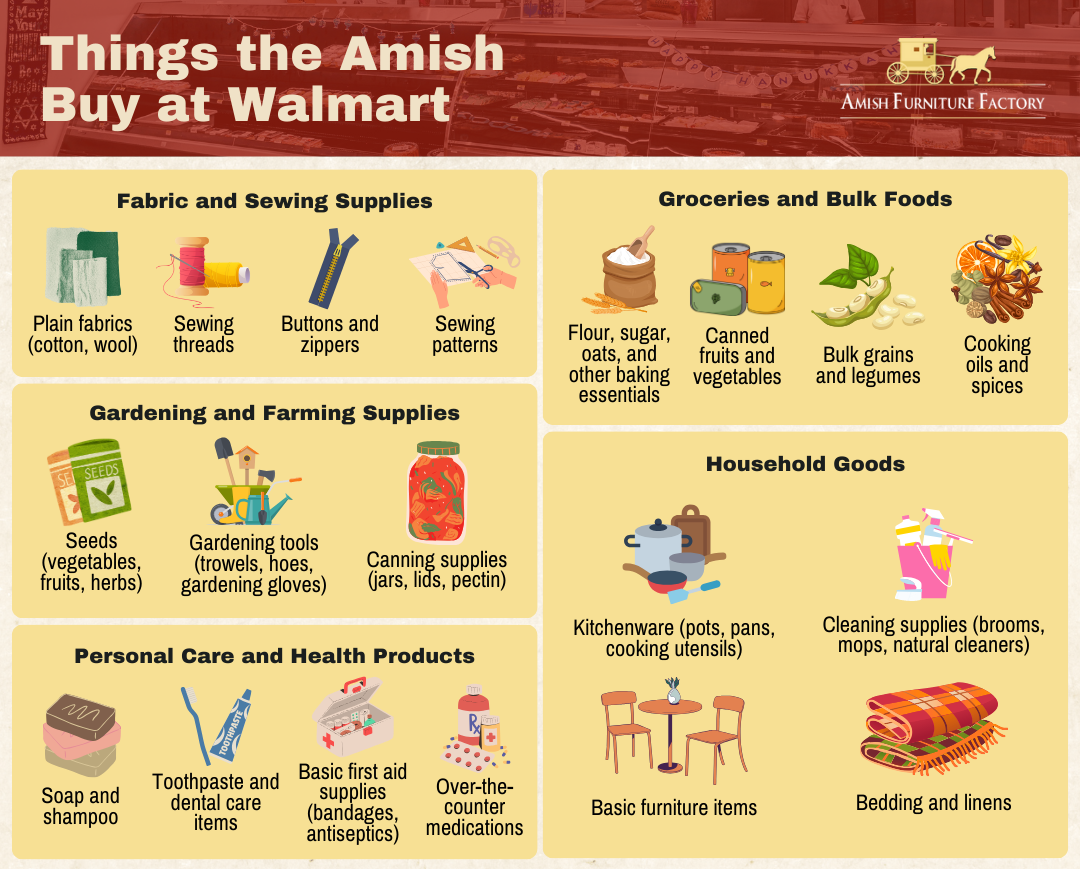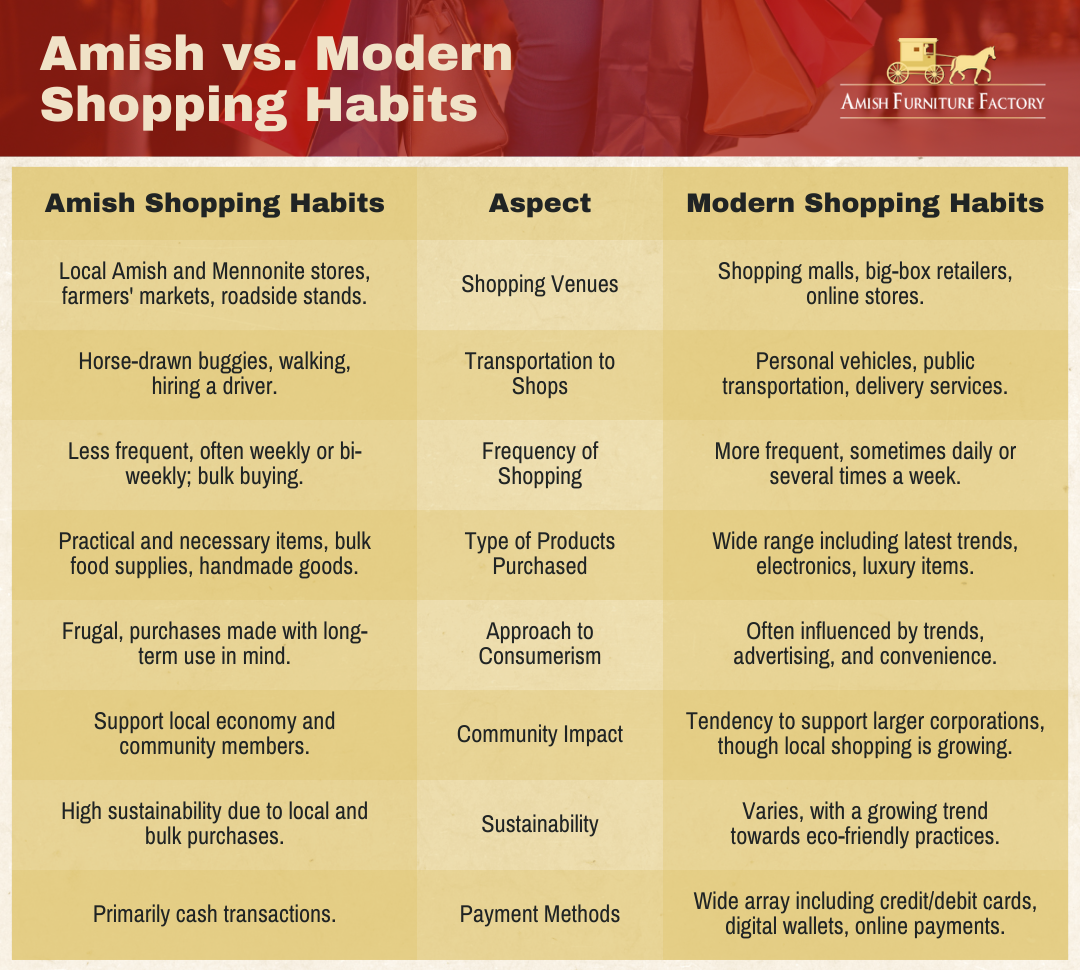The Amish community, known for its simple living, plain dress, and reluctance to adopt many conveniences of modern technology, presents a fascinating study in contrast when juxtaposed with the modern retail giant, Walmart.
The Amish, known for their simple and traditional lifestyle, do shop at Walmart for practical needs. They choose items that align with their values of simplicity and practicality, such as bulk foods, fabrics, and farming supplies, while avoiding luxury or high-tech products.
This article explores the intriguing intersection of the Amish lifestyle with contemporary consumer culture, focusing on their engagement with Walmart, one of the world’s largest retail stores.
Walmart: A Popular Destination for the Amish?
Walmart’s ubiquity and accessibility make it a notable point of interest for various communities, including the Amish. Despite their traditional lifestyle, the Amish, like any other group, require a range of products for daily living, many of which might be difficult to produce independently.
Walmart, known for its extensive range of products and competitive pricing, becomes a practical option.
Geographic Proximity
Many Amish communities are located in rural areas of the United States, often within reasonable distance to small and mid-sized towns where Walmart stores are commonly found.
This geographical proximity makes Walmart a convenient option for the Amish, especially considering their transportation limitations.
Range of Products
Walmart’s vast selection of goods is a significant factor in its appeal. The store offers a variety of items that align with the Amish way of life, including agricultural tools, gardening supplies, bulk food items, and basic clothing materials.
For the Amish, who prioritize self-sufficiency and simplicity, being able to purchase these essentials in one location is both convenient and economical.
Affordability
Cost is a crucial factor for the Amish, whose lifestyle and religious beliefs advocate for frugality and careful financial stewardship.
Walmart’s reputation for low prices is attractive to the Amish, allowing them to make the most of their resources without compromising their commitment to a modest and simple life.
Types of Products the Amish Might Purchase at Walmart
The Amish community’s purchases at Walmart are guided by their values of simplicity, practicality, and self-sufficiency. Their unique lifestyle and cultural beliefs influence the types of products they select.
Understanding these choices provides insight into how the Amish maintain their traditional way of life while interacting with a modern retail giant.
Fabric and Sewing Supplies
The Amish are known for making their own clothing, which adheres to their standards of modesty and simplicity. Walmart’s selection of fabrics, threads, buttons, and other sewing necessities is a valuable resource.
They often look for plain and durable materials, avoiding flashy or trendy patterns. This self-reliance in clothing aligns with their ethos of humility and modesty.
Groceries and Bulk Foods
Walmart’s grocery section offers a variety of bulk food items that are essential for the Amish kitchen. Items like flour, sugar, oats, and other staples are commonly purchased.
Additionally, the Amish may buy canned goods, especially during winter months or when certain produce is out of season, to supplement what they grow on their farms.
Gardening and Farming Supplies
Given their agrarian lifestyle, the Amish might purchase gardening tools, seeds, and farming supplies from Walmart.
These items are essential for maintaining their farms and gardens, which are central to their self-sustaining community life. Items like hand tools, canning supplies, and perhaps even some animal care products can be part of their shopping list.
Household Goods
For household needs, the Amish may select items that are functional and durable. This includes kitchenware like pots, pans, and utensils, as well as other basic home necessities.
These items, while modern, are chosen for their utility rather than luxury or aesthetic appeal, fitting into the Amish practice of living a simple, unadorned life.
Personal Care and Health Products
Personal care items such as soap, shampoo, toothpaste, and over-the-counter medications are also likely to be on the Amish shopping list. These basic health and hygiene products are necessities, and Walmart’s variety and pricing make it a convenient place to purchase these items.
Where Do The Amish Go Shopping?
The shopping habits of the Amish community are closely tied to their values of simplicity, frugality, and community. Despite a general avoidance of modern conveniences, the Amish do engage in shopping for necessities, but their choice of where to shop is distinct.
So, apart from Walmart, where do Amish people go shopping?
Local Amish and Mennonite Stores
A primary shopping destination for the Amish is within their own or nearby Mennonite communities. These local stores are often small and family-run, offering a range of products from homemade foods and fabrics to handcrafted furniture.
This not only provides the Amish with goods that are in line with their lifestyle but also supports the local economy and strengthens community bonds.
Farmers’ Markets and Roadside Stands
Farmers’ markets and roadside stands are also popular among the Amish for both selling and buying goods. Here, they can find fresh, locally-sourced produce, homemade baked goods, and a variety of handcrafted items.
These markets are a reflection of their commitment to simplicity and self-sufficiency, allowing them to support local agriculture and artisans.
Bulk Food Stores
For the Amish, bulk food stores are a practical choice. They cater to their needs for large quantities of basic food items, necessary for their typically large families and communal gatherings.
These stores offer goods like grains, baking supplies, and canned goods at affordable prices, which aligns with their value of frugality.
Discount and Salvage Stores
Discount and salvage stores are also frequented by the Amish. They appreciate the lower prices for goods that are still functional and of good quality. These stores allow them to make practical purchases without the extravagance or waste that is often associated with more mainstream retail shopping.
Hardware and Agricultural Supply Stores
Given their reliance on farming and manual labor, hardware and agricultural supply stores are essential for the Amish. They visit these stores for tools, equipment, and supplies necessary for maintaining their farms, businesses, and homes.
Non-Amish Local Stores and Supermarkets
For certain items that are not available within their community, the Amish might visit local non-Amish stores and supermarkets.
While they generally avoid large chain stores, they do make exceptions when necessary, typically focusing on practical and essential items.
Amish Views on Consumerism and Materialism
The Amish community holds a distinct perspective on consumerism and materialism, shaped by their deep-rooted religious beliefs and cultural practices. Central to their way of life is the emphasis on simplicity and modesty, which manifests in a minimalistic approach to possessions.
They view the accumulation of material goods as potentially distracting from spiritual and community values.
In stark contrast to the individualistic nature of consumerist culture, the Amish prioritize community and collective well-being. Their economic practices reflect this, with a preference for supporting local businesses and artisans rather than participating extensively in the broader consumer market.
This approach underscores a commitment to what benefits the community as a whole rather than individual material gain.
Below, you’ll see the differences between Amish and modern shopping habits:
Self-sufficiency and frugality are also integral to the Amish ethos. They endeavor to produce most of what they need through their own labor and the resources of their community, which minimizes their reliance on external markets.
This lifestyle choice is accompanied by a deliberate avoidance of unnecessary spending, further distancing them from typical consumerist behaviors. In essence, the Amish lifestyle is a conscious choice to prioritize spiritual and communal values over materialism and consumerism.
Conclusion
Known for their commitment to a simple, modest lifestyle, the Amish navigate the modern retail environment with discernment, guided by their cultural and religious values.
Walmart, with its wide range of products, affordability, and geographical accessibility, emerges as a practical option for them, despite their general inclination towards self-sufficiency and community-based commerce.
Their selective shopping at Walmart for necessities like fabrics, groceries, and household goods, while avoiding items that conflict with the Amish beliefs, exemplifies their ability to adapt to modern necessities without compromising their core values.
This interaction highlights the Amish’s unique approach to consumerism, where practical needs are met within the bounds of their commitment to a simple, community-focused way of life.






